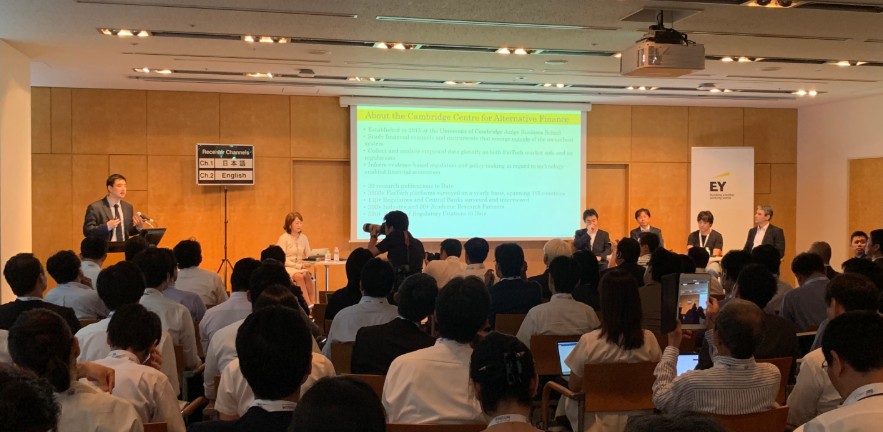Global RegTech industry earned an estimated $5 billion in 2018 following five-year surge in startup activity, says first Global RegTech Benchmarking Report by the Cambridge Centre for Alternative Finance with support from EY Japan.

The global RegTech (Regulation Technology) industry generated an estimated five billion dollars in revenue in 2018, as regulatory changes and technological advancements drove a surge of new startups in the past five years. These estimates were unveiled today, 4 September, in the first Global RegTech Industry Benchmarking Report issued by the Cambridge Centre for Alternative Finance (CCAF) at Cambridge Judge Business School and sponsored by EY Japan.
CCAF’s first in-depth study of the RegTech sector suggests the industry is seeing rapid growth and an expanding global footprint. As of 2018, RegTech firms employed an estimated 44,000 people globally, having raised about $9.7 billion in external funding to date. About 60 per cent of all RegTech vendors in the CCAF research sample were founded between 2014 and 2018, and 82 per cent had their first funding round during this period.
The CCAF report, which is based on a survey of 111 RegTech firms and qualitative interviews with industry experts and regulators, was unveiled at the FIN/SUM in Tokyo, the largest FinTech event in Japan.
The report found that the industry is already highly international, with fewer than one-third of RegTech vendors active in just one market and over a third present in five or more jurisdictions. Nearly two-thirds of vendors had a physical presence or significant market share in the UK, and nearly half have the same in the US. There are also significant RegTech activities in Australia, Canada, Singapore, Hong Kong, Japan, Luxembourg, Switzerland, Ireland, Germany and France.
Survey findings suggest that a few key technologies, including the cloud, natural language processing and machine learning, as well as big data analytics, are at the heart of RegTech activity. RegTech offerings have been particularly in demand from firms that have to report large volumes of data to standard formats for supervisory purposes, or firms that risk large fines or criminal sanctions for not complying with specific regulations.
By looking at how technologies interact with client use cases, CCAF researchers identified five distinct segments of the RegTech market. The largest by funds raised to date were the profiling and due diligence and dynamic compliance segments, while the largest share of turnover was claimed by firms in the reporting and dashboards and risk Analytics segment. A smaller market monitoring segment was also identified.

The report also points to challenges facing the industry. Long sales cycles, complex IT planning within client institutions, difficulties in establishing trust and high levels of competition have left some vendors struggling to gain traction. A handful of larger vendors thus dominated most funding and commercial activity; but a half had raised less than $1.6 million; and over a quarter had received no formal external funding. The report suggests that partnerships and co-creation with clients and other partners can help overcome such constraints.
Bryan Zhang, Executive Director of the Cambridge Centre for Alternative Finance, said in a foreword to the report:
Building on our Centre’s previous work in benchmarking various FinTech sectors, this report brings together empirical data in order to elucidate the size, growth, dynamics and development of the RegTech sector. The report findings point to a rapidly growing and technology-enabled global industry serving an increasingly diversified customer base, yet still working to establish trust and credibility as it matures.
Keiko Ogawa, Partner and RegTech Leader of EY Japan, said in a foreword:
In close collaboration with the EY Global Network, EY Japan has been working with many parties in public and private sectors to create a global environment that boosts RegTech innovation. A variety of key players, including regulated companies, regulators, technology start-ups, and research institutions, can contribute to each other and mutually benefit, and further drive innovation in the entire society.
The report’s survey fieldwork was supported by the International RegTech Association (IRTA) and the Australia-based RegTech Association, while EY Japan and the Fintech Association of Japan helped CCAF reach more of the Japanese RegTech market.

Firms headquartered in Japan made up four per cent of the survey sample and just over twice that total (nine per cent) had operations in the country. While both figures place Japan within the top RegTech jurisdictions, they are small relative to its share of world GDP and trade, suggesting room for further growth.
Emmanuel Schizas, Lead Researcher at the Centre commented on the findings from Japan:
The local market stands out compared to those of other countries for the high share of non-financial industries such as food, personal care, healthcare, pharma and public administration in RegTech firms’ sales pipelines. There is a greater emphasis among Japan-based firms on fraud detection and customer identification as core use cases, particularly those powered by machine learning.

